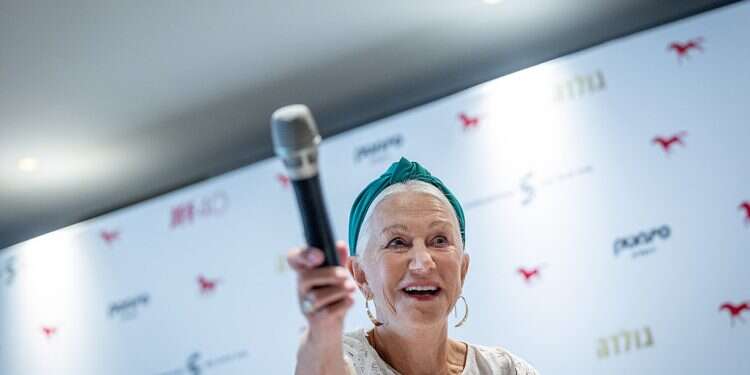Helen Mirren, who plays Israel's first female prime minister in her latest film, says she has been inspired by the widespread protests underway against the country's current premier, Benjamin Netanyahu.
Mirren, who portrays the late Golda Meir during the 1973 war between Israel and a coalition of Arab states in "Golda," is visiting an Israel similarly beset by crisis as mass demonstrations take place against Netanyahu's plan to overhaul the country's judicial system.
Follow Israel Hayom on Facebook, Twitter, and Instagram
Mirren told a news conference before the opening of the Jerusalem Film Festival that she is inspired by the protests.
Video: Protesters against the judicial reform near the US Embassy Branch Office / שב״פ, נורית צינס
"I'm personally very moved and excited when you see these huge demonstrations," she said. "I think it's a pivotal moment in Israeli history."
Netanyahu's coalition government, which took office in December, is the most hard-line ultranationalist and ultra-Orthodox in Israel's 75-year history.
For over six months, hundreds of thousands of people have taken to the streets to protest the proposed judicial overhaul. Netanyahu's allies say the plan is needed to rein in the powers of an unelected judiciary. His opponents say it is a thinly veiled power grab that will destroy the country's fragile system of checks and balances.
Video: Helen Mirren speaks at the event in Jerusalem / No credit
Mirren contrasted the leadership of Meir — who often served coffee to her military advisers as they convened in her kitchen to discuss strategy — with that of Netanyahu, who has a reputation for being aloof and out of touch with everyday Israelis.
"She had immense power, but she was perfectly happy to toddle around in the kitchen, making everyone coffee and being the grandmother," Mirren said. "It's a very different attitude toward power — from the male, Netanyahu type of power to the Golda Meir kitchen power."
Mirren's visit also comes at a time when Netanyahu's government is moving to deepen its hold on the West Bank. His government has approved plans for thousands of homes in West Bank settlements, and tensions with the Palestinians are rising.
"There was no such thing as Palestinians," Meir said in an interview with the Sunday Times. Israel's far-right Finance Minister Bezalel Smotrich echoed Meir recently, stating, "there is no such thing as a Palestinian people."
Lior Ashkenazi, the Israeli actor who plays the head of the Israeli army in the film, said he thought Meir would support efforts to annex the West Bank.
"Even though she was a socialist," Ashkenazi said, "I think she would definitely support the settlers."
The film, directed by Guy Nattiv and written by Nicholas Martin, focuses on Meir's leadership during the 1973 Mideast war, when a coalition of Arab states led by Egypt and Syria launched an attack on Israel on Yom Kippur, the holiest day of the Jewish calendar.
Under the leadership of Meir and Israeli military officials, Israel emerged victorious from the war, its forces standing within 70 miles (120 kilometers) of the Egyptian capital of Cairo. The war's outcome laid the groundwork for a peace agreement between Israel and Egypt.
But Israel suffered heavy losses during the war, and Meir was criticized for the government's lack of preparation and refusing to act on intelligence indicating an attack was imminent. Meir resigned the following year, and the national trauma in the wake of the war set off a process that would bring the right-wing Likud party, which Netanyahu currently leads, to power in 1977.
Mirren, a British-born actor, has won both Oscar and Emmy awards for performances ranging from Queen Elizabeth II in "The Queen," and Sofia Tolstoy in "The Last Station."
Subscribe to Israel Hayom's daily newsletter and never miss our top stories!




